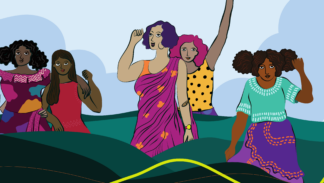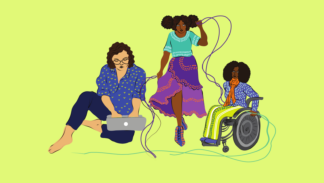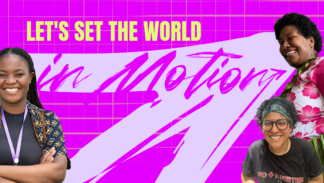Voices of joy & resilience from the bold women’s movement in Mexico
By Eva Kolodner, Global Fund for Women
“We were founded because we saw women doing amazing things, but we were not seeing these stories in the media. We believe in the power of storytelling. We also believe in a world in which women can live a life of JOY.”
These words—spoken by Lourdes Barrera, one of the founders of an amazing young women’s media organization called Luchadoras (“Women Warriors”)—echoed throughout the trip I took to Mexico along with a group of supporters and partners of Global Fund for Women. This inspiring journey was organized by Global Fund for Women in partnership with Semillas, the women’s fund in Mexico. Its purpose: to visit and meet with grassroots women’s groups our funds have supported throughout the country. Lourdes’ words truly encapsulated the bigger vision of our shared work to support women’s movements, and why and how we stay committed to it.
I hope reading not only my personal reflections, but also those of a few of the dedicated supporters who also participated in the trip, will help you to feel as though you were on this journey with us (and even inspire you to join the next one!).
This trip brought to life in vivid detail the way that Global Fund for Women works with women’s funds like Semillas around the globe, and how the power of these institutions and their deep knowledge of local context can multiply the resources we each bring, and amplify feminist voices in the region and around the world. Each organization has its role to play in this sisterhood, and the whole is so much more than the sum of its parts.
I was energized by the passion, commitment, and knowledge possessed by Laura Garcia, the Executive Director of Semillas. She not only introduced us to the context in Mexico faced by women’s rights defenders, but has such a nuanced understanding of the intersecting issues that define women’s lived experience in this beautiful and complicated country.
I feel honored to have participated in the “master classes” Laura and Global Fund for Women VP of Programs Leila Hessini hosted in the back of the van that took us from place to place during our stay—conversations about the diversity of perspectives on what constitutes ”women’s rights,” what it really means to be part of an “intersectional movement” and how race, class, and privilege are refracted differently through different national contexts.
And I was moved to see bold, determined women turning an incredible tragedy—in this case, last year’s earthquakes in Oaxaca, Chiapas, and Mexico City—into an opportunity. The activists we met are working in a context of pervasive violence, rampant impunity, and systemic discrimination, but are building alliances, marshalling resources, and providing long-term, strategic vision to their efforts to rebuild.
Ellen McCoy
I was profoundly moved by the courage and commitment of the grantee partners I met in Mexico while traveling with Global Fund for Women. While I had been aware of the increasing migration and attendant violence in Mexico, the trip enhanced my understanding of the particular dangers and difficulties faced by women in a more nuanced way. Alongside these difficulties, women’s groups are rising with impressive stamina and optimism to meet these challenges and give hope for the future. This is daunting work, and sometimes dangerous. I was inspired by Pilar Muriedas, one of the founders of an organization in Oaxaca called Consorcio. Because so many human rights activists face threats and violence because of their work, the organization has created a safe haven for human rights workers across the region to rest and re-charge when they are facing burnout. They also host monthly therapy groups for the staff at Consorcio to help them help each other and themselves stay strong in difficult circumstances.
Another grantee, Mujeres Que Tejen, is a group of indigenous women who were left on their own when the men in their communities had to migrate for work. Separated by language and geography from economic participation to support themselves, over the last two decades the group has developed a thriving business in their traditional craft of rug weaving. This evolution was set in motion by a seed grant in 1992 from Global Fund for Women’s sister organization Semillas, itself made possible by an initial seed grant in 1990 from Global Fund for Women. It was a privilege to witness groups thriving today, made possible by early seed grants that have sprouted and grown like trees which will hopefully develop into a forest.
This was my first trip with Global Fund for Women, and it confirmed my confidence that their model of funding groups on the ground ensures that resources get to their intended recipients, and their strategy to fund at critical leverage points optimizes their investment dollars. I will continue to support this wonderful organization.
Lori Barra
Executive Director, Isabel Allende Foundation
One reason I went to Mexico with Global Fund for Women was to more fully understand the issues around migration. At the Isabel Allende Foundation, we have seen a surge of traumatized newcomers in the school programs that we support in California. I wanted to truly understand the plight of the migrant so that we could better support their needs before, during, and after they arrive in our neighborhoods. Many of the children that arrive at our borders are unaccompanied. The majority of migrant children arriving to our school systems in Northern California are now from Guatemala and Honduras rather than just Mexico and they arrive severely traumatized from rape, torture, prior threats on their lives, severe separation anxiety, and depression. In many cases, children come to be reunited with their mothers whom they barely know, since their moms left when they were infants or toddlers. These newcomers are leaving behind their grandmothers and the community that raised them. They arrive in a foreign country after a perilous journey without any support along the way, to hostile politics and sometimes only speaking their indigenous language, not even Spanish.
I asked a woman from one of the grantees we visited: “What message do you want me to take back to the USA (my country)? How can we help?” And she said, “Be better informed. Have the right information. Take the right action. Remember your country was built on the backs of immigrants just like us. Our parents, our children have all helped shape your country and your economy.”
It was at that moment that I further sealed my commitment to support Global Fund for Women and their incredible “ground-up” work building women’s movements in Mexico and all over the world. Our Foundation is built on the idea that when one is in doubt, do the most generous thing. That exemplifies the work of the Global Fund for Women.
Laurie Emrich
Global Fund for Women Board Member
I first “met” Global Fund for Women in 1995, when it was in its early days of its strategy to seed, strengthen, and support the growth of women’s funds worldwide. I became an immediate admirer, drawn particularly to this component of Global Fund for Women’s work because I know the importance of trusting communities to define their own problems and priorities. The presence of a local funder makes that connection even stronger. Trees rooted in the rich soil of local knowledge, customs, and resilience will likely grow sturdy, stand for decades, and in turn provide some of the smartest sustenance for local “saplings.”
So when the opportunity came along to visit Mexico and meet with Semillas, the women’s fund in Mexico, I was all in. Day one of our trip, we were wowed by Semillas Executive Director Laura Garcia’s comprehensive and cogent overview of current Mexican politics and economy, and her description of the range of daunting issues facing urban and rural women, indigenous women, Afro-Mexicans, lesbians, and trans people.
In particular, human rights defender Bettina Cruz’s presence and words have stuck in my mind: “There is a great deal of violence when we raise our voices. We face constant dangers and threats of death.” Bettina—the co-founder of Comite de Mujeres de la Asamblea de Pueblos Indigenas del Istmo en Defensa de la Tierra y el Territorio—has been jailed for defending indigenous lands against multinational forces, and still lives on the edge for continuing her work to protect her community. Amazingly her daughter, Marina, who accompanied her to the meeting, has also chosen to work for the Asamblea.
After 27 years Semillas is indeed a well rooted and towering tree in the Mexican landscape, funding in the areas of body, work, identity, and land. They have marshalled over $21.8 million to their mission over their history. Their local donor base is growing, as well as their international reputation.
Returning to a global lens, today Semillas is one of 19 women’s funds that have been seeded and strengthened by Global Fund for Women. In my view, this strategy has been a very powerful means of growing and sustaining global women’s movements. Global Fund for Women plans to maintain this as a priority in coming years, and I’ll be right there with them.


